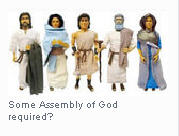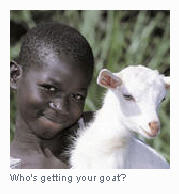
Somewhere in Africa, there's a goat with an unsuspecting Kenyan family's name on it. I adopted the animal for them after coming across the idea in a holiday catalog from the non-profit group Heifer International. But the gift wasn't only for the Kenyan family; it was also for my own.
When I told my kids that one of their coveted Hanukkah presents would be rerouted to a needier family, they were confused at first, then entranced. My nine year-old was eager to plot Kenya on a globe, while his twin six year-old sisters schemed ways of sending comfy animal beds overseas. It inspired more discussion than a typical holiday gift, even one that doubles as an mp3 player, giggles when shook, and can safely bake small cakes.
I just hope Heifer tapes a gift receipt to the goat's belly in case the family wants to trade up for a llama.
Offering gifts to less fortunate strangers feels right, but it's still pretty rare. Holiday compassion, which most of us value but seldom practice, is the opposite of holiday commercialism, which most of us practice but never value.
To be fair, you can find examples of holiday generosity when you look. Every winter, nonprofit organizations distribute donated coats to those who can't afford them, and toy collection efforts have been around since Silly Putty.
But more often than not, those compassionate efforts only get substantial exposure when they're mired in controversy.

The U.S. Marines' "Toys for Tots" program got its best publicity ever when it decided in 2006 to refuse a donation of thousands of gospel-spouting Jesus Christ dolls. They feared offending Jewish and Muslim families -- or possibly confusing kids who might excitedly mistake Jesus for Obi-Wan Kenobi.
But faster than you can say "Merry Christmas and Welcome to Wal-Mart," the Marines did an about-face and accepted the dolls anyway.
Growing up Jewish, I've never really connected holiday compassion to Hanukkah, which is more about spirituality than selflessness. The festival of lights focuses on the story of Jews who, for lack of an all-night convenience store, ran perilously low on olive oil, but managed to make it last eight nights. I have the same miraculous experience with my toothpaste every six months or so, but I keep that to myself.
I didn't really begin to consider religion seriously until late in life, despite some formal religious training in my youth. When I was 13, I had my Bar Mitzvah in Alief, Texas, a tiny suburb outside Houston. Our congregation's temple was so miniscule that we'd rent out the local church for big events. We'd just hide the crosses and New Testaments and Oy Voila: a perfect Bar Mitzvah venue. The only problem was the invitations:
"You are invited to celebrate Joel's Bar Mitzvah and his transition to Jewish manhood...at the First Church of Jesus Christ Our Lord and Savior."
When I left home for NYU, it wasn't long before I began rationalizing forbidden practices like eating on Yom Kippur, making sandwiches on Passover, and ordering shrimp appetizers. (Eating, forbidden or not, is a big deal amongst Jewish folks). I joined a large Jewish student organization, but like so many others in the group, I was more focused on dating than deities. In fact, I think it was those guys who introduced me to shrimp.

Naturally, I passed my lazy reverence onto my kids, whose exposure to their own religion has been limited to annual Hanukkah Brachos and one overtly Jewish Power Ranger. (Season 13's "Bridge Carson," if you must know. He couldn't have been "Bridge Goldstein"?)
During holiday time we gamely try to respect everyone's cultural leanings. I unpack the Hanukah accouterments and yarmulkes the way other families unpack tree ornaments. My kids and I light the menorah, but have also exchanged gifts on Christmas morning. We spin dreidels, but also stop and gawk at elaborate decorations on neighboring houses. We focus a little too much on presents, but also... focus a little too much on presents.
Still, it's the holidays when I still feel most comfortably spiritual now, mostly thanks to the human warmth that accompanies gift-giving. Connecting the holiday to acts of selfless generosity, like gifting a goat, is a mitzvah that creates no messy religious inconsistencies, unless the said goat is a Scientologist.

Our new Kenyan friends don't need to be thinking of me and my kids when their gift arrives, though they can pay it forward. The great thing about this kind of program is that recipients traditionally "pass on" their animals' offspring to others in their community. Not only can't you do that with a Playstation 3, but it isn't even considered re-gifting!
My main hope is that, through our generosity, the Kenyan family realizes there are parts of the better-developed world where, come holiday time, caring families of all faiths will still go out and practice compassion alongside religion and frenzied holiday shopping.
And as long as those people are out, they should pick up some extra olive oil just in case.